The Ford Bronco is one of the most capable – and powerful – 4x4s you can buy right now. The thing can go almost anywhere there isn’t pavement. But what if you’d like a Bronco that’s more agreeable on the pavement?
One that’s more practical?
One that gets much better gas mileage, has more room for your things and costs less, too?
That would be the Bronco Sport.
What It Is
The Bronco Sport is a different take on the Bronco concept that tilts the scales a little more toward practicality over no-compromises off-road capability.
The two look a lot alike but the Bronco Sport is actually a separate model in its own right that doesn’t share its underlying mechanicals or even its layout with the Bronco (sans the Sport), which is a 4×4 SUV rather than an AWD crossover that looks like a 4×4 SUV.
Also, the Bronco comes in two or four-door bodystyles and is available with a manual transmission.
Sport comes with four doors – and is automatic-only.
All-wheel-drive and a turbocharged three cylinder are standard, the latter upgradable to a larger, stronger turbocharged four cylinder engine.
Base price of $29,215 (as opposed to $32,295 for the Bronco sans the Sport).
A top-of-the-line Badlands trim with the bigger/stronger engine, a heavier-duty AWD system with a twin-clutch rear axle and all-terrain tires, tow hooks, skid plates and rubberized flooring stickers for $36,590.
That’s about half the price of a a top-of-the-line Bronco Raptor – sans-the-Sport – which stickers for $73,780.
What’s New For 2023
A Heritage appearance package has been added to the mix. It features a contrast-colored (Oxford White) roof that makes it look like the roof might be removable, as the original 1966 Bronco’s was. The package also includes what look like ’70s-era steel wheels, painted the same Oxford White color as the roof. These are shod with taller (29 inch tires) All-Terrain that give the Sport a stance more like the Bronco’s.
There’s also a new Black Diamond package that bundles 17 inch aluminum wheels with skid plates and a special graphics package.
What’s Good
Much more of-road capable than the typical AWD crossover.
Doesn’t look like the typical AWD crossover.
A more practical everyday driver than the more singularly focused Bronco (sans the Sport).
What’s Not So Good
Only the one bodystyle.
No manual transmission option.
Modest towing capacity (2,200 lbs. max).
The Bronco Sport is available with either of two engines. The first – standard – being a really small (1.3 liter) three cylinder engine that still manages to make a comparatively big 181 horsepower; this is competitive with the output summoned by many current non-turbocharged four cylinder engines in the 2.0 liter range.
Also standard is an eight speed automatic transmission, which has more than twice as many gears as the tiny engine it’s paired with has cylinders. Two of these are overdrives, which is how Ford engineers managed to wring 25 city, 28 highway out of this 3,467 pound crossover.
All Bronco Sports come standard with AWD.
It is optional in a number of others in the class, including the Toyota RAV4 and Honda CR-V. These get slightly better mileage (27 city, 35 highway for the RAV4) but they aren’t as geared up – so to speak – for off-road conditions as the Ford.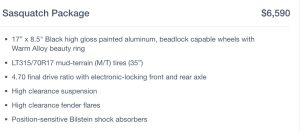
Toyota does offer a more rugged TRD version of the RAV4 that also comes standard with AWD and 8.6 inches of ground clearance, but its base price of $37,595 makes it more expensive than the top-of-the-line Bronco Badlands, which comes standard with a much stronger (250 horsepower) 2.0 liter turbo’d four (vs. the RAV’s 203 hp 2.5 liter four) as well as a lifted suspension and 8.6 inches of ground clearance, a heavier-duty AWD system and an upgraded version of the eight speed automatic, with Terrain-specific drive modes, including rock crawl.
You can amp up the Badlands’ off-road CVs by adding the $6,590 Sasquatch Package, which bundles 35-inch M/T tires on 17×8.5 inch beadlock-capable wheels, high-mount fender flares, Bilstein gas shocks and a 4.70 final drive ration with locking front and rear axles.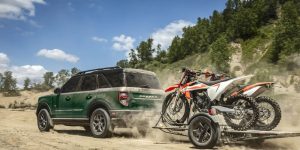
No other compact crossover in the segment offers comparable off-road equipment.
This one also tips the scales at a hefty 3,707 pounds – and that probably explains why it comes standard with the larger (2.0 liter) four cylinder engine that makes 250 horsepower.
Although it is the most powerful compact crossover in its price range – when equipped with the 2.0 liter engine – the Bronco Sport’s max tow rating is only 2,200 lbs. (2,000 lbs. with the base 1.5 liter engine). This is less than others in the class are rated to pull, including the RAV4 TRD, which carries a 3,500 lb. max tow rating, notwithstanding the latter’s less-powerful engine.
Naturally, gas mileage also dips a bit – to 21 city, 26 highway. This is (again) less than the mileage delivered by other medium-small crossovers but the Bronco Sport Badlands makes up for that by being the most off-road capable crossover in the class.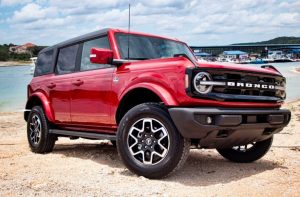
On The Road
It doesn’t just look like a Bronco. It also doesn’t drive like every other crossover.
It drives more like the 4×4 SUV it isn’t – and that’s a pretty neat trick. It has a much hunkier feel than the Ford Escape – hush now! – it’s based on. The latter is a fine small crossover – but it isn’t a Bronco. And neither is this one, in terms of extremes. It is rugged-feeling (and it’s not just feeling) enough to put meaningful distance between itself and the Escape and the light-duty crossovers the Escape is more like – while at the same time imparting the feeling (and the fact) that you are driving something like the Bronco, that doesn’t just look like it.
Without being too much like the Bronco it looks like. 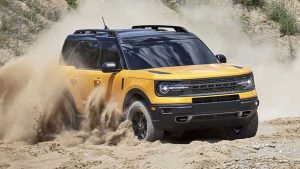
The Sport, though heavier than other crossovers it size, is almost 1,000 lbs. lighter than the Bronco, which also rides on a wheelbase that’s nearly five inches shorter (100.4 inches vs. 105.1) and stands almost two inches taller at the roofline while also having more air in between the pavement and its floorpans – 8.4 inches of standard ground clearance vs. 7.8 for the Sport. These attributes contribute greatly to the Bronco’s off-road chops but they have a cost, on-road.
Given what it can do – and where it can go – the Bronco is still far more highway (and in-the-curves) friendly than its metal floorpanned namesake of the ’60s and ’70s.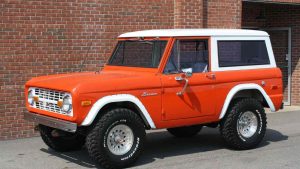
But it’s not exactly the ideal tool for daily driving.
The Sport is.
It goes everywhere, comfortably and easily – and a Badlands Sport can go almost anywhere the Bronco can that 99 percent of people would even try going. It can go faster – in the curves – than 99 percent of Bronco drivers would dare to try going, assuming they’re sensible.
Think of the Sport as a Swiss Army knife vs. a Kabar and you’ll get something of the gist.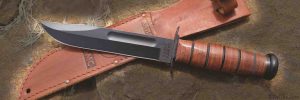
You will probably want to spring for the optional 2.0 liter engine, however. The standard 1.5 liter engine isn’t a bad engine but it’s arguably too small an engine for almost two-tons of Bronco Sport (which is what this rig will weigh, or close to it, with you and a passenger on board). The optional 2.0 liter engine has the power to make light of it, so to speak. In fact, the 2.0-equipped Sport is just about as quick to 60 (about 8.2 seconds) as the Bronco equipped with a 2.3 liter, 300 horsepower engine (7.6) while being a lot easier on gas.
The latter only manages 21 MPG . . . on the highway. 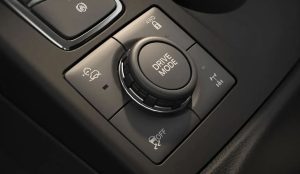
Even so, both Broncos go much farther on a tankful (more than 400 highway miles for the Sport) than any EV and you’ll never have to wait more than a few minutes to get back on the highway for another 400 miles.
The eight speed automatic is hard to fault except that it’s not a manual – which you can get in the Bronco. A stick have made the Sport really stand out from the automatic-only crossover crowd.
But it isn’t a CVT automatic – and that’s not a bad middle ground.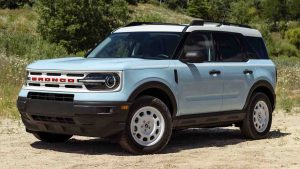
At The Curb
Behind the wheel, you look out across a broad, squared-off hood with a pair of what look kind of like picatinny gun rails on either side; these lead forward to an almost vertical grill with bold B-R-O-N-C-O lettering and what at first glance appear to be ’70s-style sealed-beam round headlights.
If you approached it from the front, you’d think it was a Bronco – either the new one or the original one.
But it’s also a very different Bronco – vs. the new one.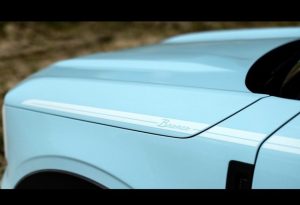
First, of course, it’s a four-door (vs. two-or-four-doors, for the new Bronco). And the roof doesn’t come off as the Bronco’s does (though the Sport’s available two-tone paint schemes make it looks as though it might).
Going topless is is fun.
But the Sport comes standard with something more useful.
That being more space – for cargo – inside. It has 32.5 cubic feet of room for whatever behind its second row and if you fold those forward, the space opens up to 65.2 cubic feet. This is almost exactly the same space as offered inside the Escape – without looking like one (not that there’s anything wrong with that). The Bronco two-door, meanwhile, has 22.4 cubic feet of storage space behind its second row and people can’t get in (or out of) the Bronco’s second row unless those in the front row open their doors and get out first, so they can get in (or out).
With its second row folded forward, the Bronco two-door’s available space for stuff opens up to 52.3 cubic feet, well shy of the Sport’s total and the stats don’t convey the greater ease of getting stuff in (and out) of the Sport’s cargo area, which has a lower load height.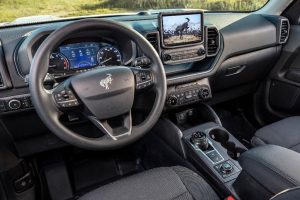
The rear gate’s glass can also be opened separately, so you can slide things in (and out) without opening the gate – and there’s a folding tray divider that serves as both a cover for what’s under and a shelf, to put more stuff on top off.
Though this is a 2023 model, the dash is almost ’70s minimalist, with straightforward analog gauges rather than the becoming-ubiquitous LCD screen. There is a small LCD display at the top of the center stack, but it’s small so it doesn’t overwhelm the interior. If you like something that has a retro feel but isn’t 50 years old, you will probably like it.
The Rest
The Bronco still comes with a 12V power point, as well as the new-style USB charge points. Many new vehicles no longer have 12V power points. Being able to plug in old-school pigtail devices (including radar detectors) is nice; just be aware that – as in other Fords – the 12V port is always on, even if the ignition is off.
Also Ford-specific is the exterior keypad entry system, nice to have in case you lock yourself out of your Bronco.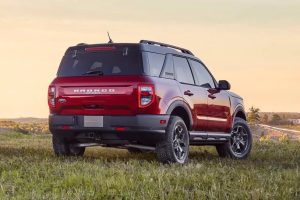
Out Banks trims have a 120V household-type outlet, too.
Every Bronco trim comes standard with Ford’s Co-Pilot 360 array of “safety” and “driver assistance tech,” including steering and braking that does those things for you when the car thinks you should be doing them – or thinks you’re not doing them properly. You may not need such “assistance” and would for that reason prefer not to buy it.
Unfortunately, Ford doesn’t offer that option.
The Bottom Line
The Sport is an appealing alternative to the Bronco as an everyday driver – well as an antidote to every other crossover.
. . .
If you like what you’ve found here please consider supporting EPautos.
We depend on you to keep the wheels turning!
Our donate button is here.
If you prefer not to use PayPal, our mailing address is:
EPautos
721 Hummingbird Lane SE
Copper Hill, VA 24079
PS: Get an EPautos magnet or sticker or coaster in return for a $20 or more one-time donation or a $10 or more monthly recurring donation. (Please be sure to tell us you want a magnet or sticker or coaster – and also, provide an address, so we know where to mail the thing!)
My eBook about car buying (new and used) is also available for your favorite price – free! Click here. If that fails, email me at [email protected] and I will send you a copy directly!


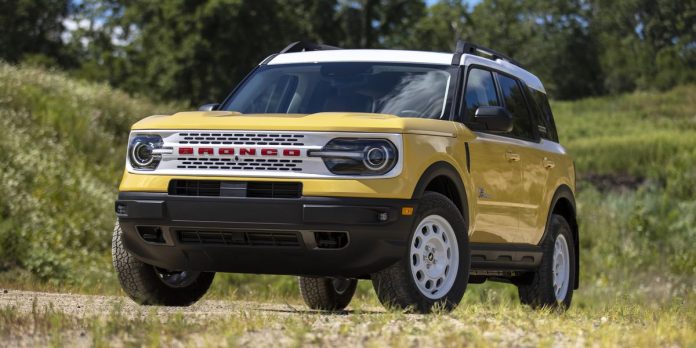










Bronco is independent front suspension and front tie rods and ball joins break very easily. Hard to get O.E. front-end parts so some go to a lift kit as the only way to fix their new Bronco.
HA HA! 3cylinder? My buddy has one with a 289. It’s a bit older and much cooler though.
3 cyl engine. Is this where we are headed to keep ICE?
Why does the top photo of a yellow Bronco Sport with its wide-spaced single headlights, squarish grille, and 1.3-liter matchbox engine remind me of a 1963 Plymouth Valiant econobox?
https://tinyurl.com/364khn3j
As the beatniks of that era were wont to say, ‘Couldn’t dig it, man.’
Small typo… “just be aware that – as in other Fords – the 12V port is always on, even if the ignition is one.”
I predict we’ll see a bunch of these being pulled out of the sand on Matt’s Off Road Recovery YouTube channel. Heck, they’ve rescued a few Broncos with mechanical failures off the dunes this year, makes you wonder if there’s a design defect or drivers pushing too hard.
Thanks, RK – fixing right now!
Call me a crackhead but I think the Sport looks better than the cartoonish Bronco! Anyone have a long term ownership experience with this vehicle? My daughter is starting her career after years of med school. She wants to upgrade from the 08 Saturn shes been driving for 6 years to a newer used vehicle. She likes the idea of a cross-over style vehicle. Not sure what the reliability of this is? Well if anyone can help out let me know!
Hi RA,
The Escape is basically the same rig (same drivetrain) and lots of these are in circulation. They seem to be pretty good vehicles. I like that Ford has not gone CVT, especially.
I agree CVT’s aren’t good for long term ownership IMO! Contrary to most people her age I’ve convinced her to be fiscally responsible and buy a 2-3 year old used vehicle and pay it off fairly quick then keep it for a few years after that! The critical part is sifting through what vehicle is a good candidate for that! Thanks!
I would go through the Saturn completely before buying a new car. For a few grand, I would go through the engine, the trans, the susepnsion and freshen the interior, change the headlights and put a good coat of wax on it.
I bet you could put about 5k in it and the car would be as good as new.
If it’s a Vue, it’s a pretty good car. Same with the Aura.
Agreed. I would hold on to the Saturn. When there is a war over Taiwan, one way or another we will be deprived of microchips. It will be easier to keep the Saturn running. Even better, get an old Bug as a backup. And forget about BEV’s just on that alone.